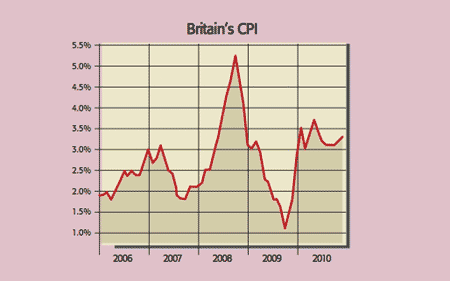
There was growing concern this week that the Bank of England has got it wrong on inflation. The annual rate of consumer price inflation (CPI) unexpectedly climbed to 3.3% in November. The rise from 3.2% the previous month was due largely to food and clothing costs. CPI has now exceeded the Bank’s 2% target for 40 of the past 49 months. The Bank said a year ago that it would be 1.7% at this stage. CPI is now likely to exceed 4% as VAT goes up in January and commodity prices are still rising. The labour market also deteriorated for the first time since the spring in the three months to October. Unemployment rose from 7.7% to 7.9%.
What the commentators said
We keep hearing from the bank that high inflation is temporary and should fall back. But “how long can a blip last before it becomes a permanent trend”? asked Buttonwood on Economist.com. Governor Mervyn King must be getting “repetitive strain injury from all the letters of explanation he has written to the chancellor”.
The Bank admitted that it has “quite seriously” underestimated the impact of sterling’s slide on inflation, said Jeremy Warner on Telegraph.co.uk. It also acknowledged that it “probably overestimated” the degree of spare capacity in the economy, and hence the downward pressure on prices, following the recession. The danger now is that the Bank’s inflation target will become less and less credible. If people start to count on inflation going up, the more they push up prices and wages in anticipation, said Allister Heath in City AM. That increases actual inflation, “triggering a self-fulfilling loop”.
So far, at least, there is little sign of such a wage-price spiral. The latest unemployment data show earnings growth running 1% more slowly than inflation. But the weakening labour market highlights another problem. A massive fiscal squeeze is just beginning to hit the economy and house prices are falling. Both will undermine consumer confidence.
With the economy looking shaky, the Bank will be reluctant to raise interest rates now. But it may soon have to do so if inflationary expectations take off, as Capital Economics pointed out. All in all, we have a “nasty, stagflationary mix”, said Ian Campbell on Breakingviews. “Rebalancing the economy was never going to be easy.”